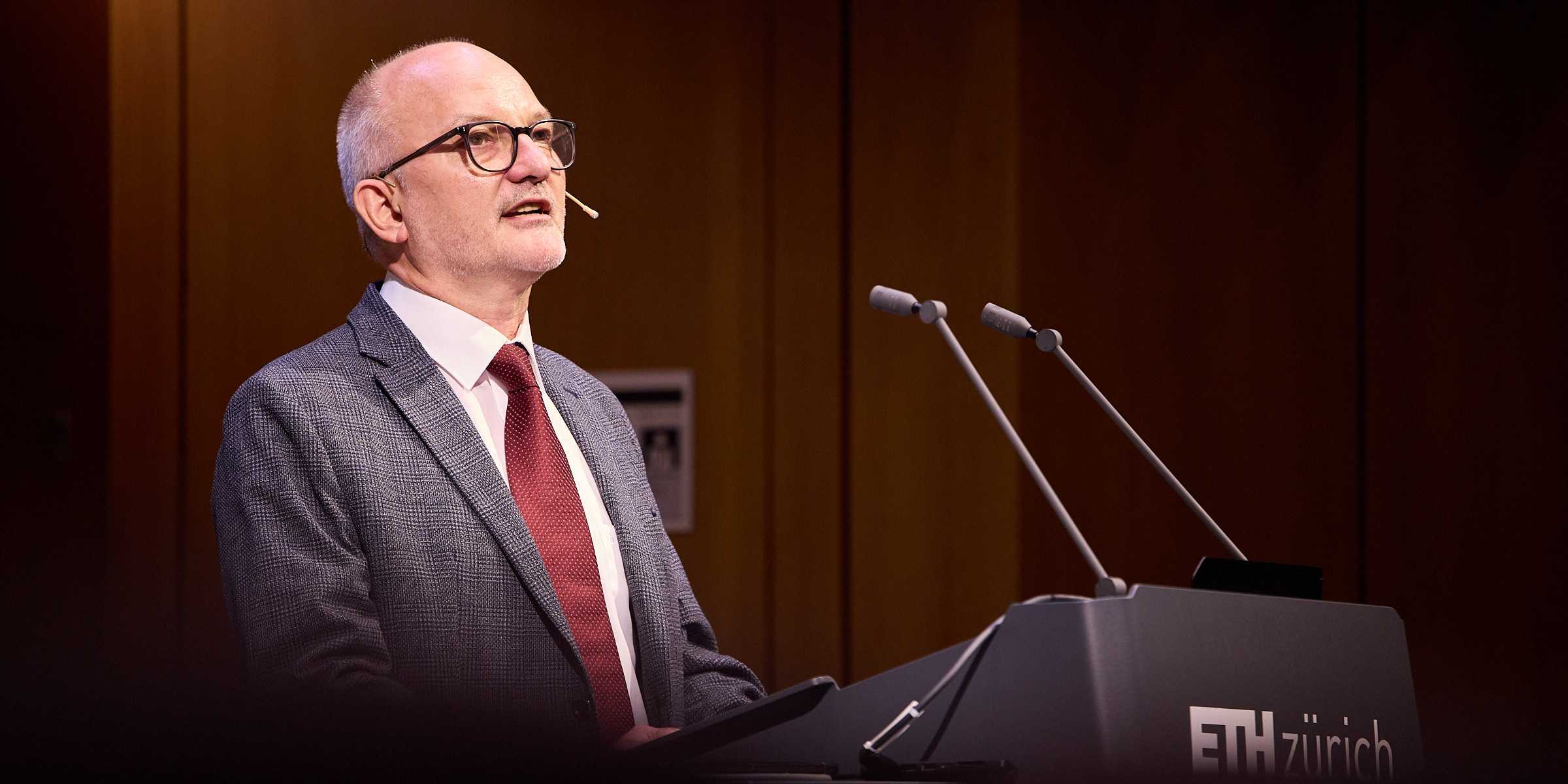
Small Triggers, Big Shifts: Looking back at 20 years of Systemgestaltung with Professor Frank Schweitzer
For two decades, Professor Frank Schweitzer explored complex social and economic systems at D-MTEC. Before retiring in early 2025, he reflects on what complexity research offers academia, organisations, and students – why understanding structural dynamics and resilience matters. Sebastian Wagner-Vierhaus interviewed him shortly after his farewell lecture.
Sebastian Wagner-Vierhaus (SW): When you joined D-MTEC and ETH Zurich in 2004, the term “systems design” was new. How did you interpret it?
Frank Schweitzer (FS): The department was established in 2004 and wanted to take a broader perspective on the dynamics of social and economic systems beyond classical production processes. “Systemgestaltung” (systems design) was one of five new professorships. Before diving into design, we needed to understand these systems. Over time, we adopted data-driven methods to uncover hidden patterns. We also developed network methods to reveal, for instance, ownership relations or financial dependencies. Agent-based models allowed us to understand how small local changes could transform entire systems. The broad methodological approach became a signature of our research profile at the Chair of Systems Design.
“In networks, indirect relations and the temporal order of interactions matter, and initial conditions often shape long-term outcomes.”Frank Schweitzer
SW: You have applied complexity thinking to finance, software development, communication networks and other systems. How did you choose these topics?
FS: Indeed, these are quite diverse topics. But from a systems perspective, they share some common characteristics. For instance, patterns of collaborations can be studied in teams of software developers, but also in research alliances of firms, in joint publications of scientists, or in parliamentary initiatives. Data-driven modelling is only possible if we have access to high-resolution data. This was one of the reasons why we focused on open-source software projects, where detailed records of every contribution provide a fine-grained view of social collaboration. To understand why some projects failed while others adapted, we also needed to model how developers influenced each other’s work. In the political realm, we examined parliamentary debates and historical letters from the Reformation, uncovering how communication forms factions or fosters consensus. Across these domains, the data varied, but some insights were strikingly similar: In networks, indirect relations and the temporal order of interactions matter, and initial conditions often shape long-term outcomes.
SW: At times, your group studied topics that seemed distant from mainstream management or economic research. Why?
FS: I would argue that not the topics, but the methods differ. We built on the approach of complexity science, which tries to identify recurring principles: System properties emerge from agents' interactions, balancing and amplifying feedback loops act together to shape the dynamics of systems, and critical parameters control their stability. From this unifying perspective, one can examine diverse social and economic systems, ranging from the Swiss parliament to the worldwide food trade. Network methods, in particular, provide an underlying logic that can be applied to a wide range of systems, for instance to financial networks or pharmaceutical distribution networks. This cross-domain approach sharpens thinking and often reveals unexpected insights.
SW: One of your key insights was that stable systems can still be vulnerable. Could you explain?
FS: Social and economic systems are adaptive, and their stability is continuously tested. While they can appear stable for extended periods, minor disturbances are sometimes sufficient to start failure cascades that lead to existential disruptions. During the financial crisis of 2008, we saw how the failure of a single institution at the wrong moment triggered a chain reaction. Similarly, in social media, a small piece of provocative content can spark a wave of emotional responses. Complex systems often harbour tipping points, where nothing seems to happen until a subtle push sends events spiralling unpredictably. Understanding these dynamics reveals that stability alone doesn’t ensure safety. What truly matters is resilience – the ability to recover or contain shocks before they spread too widely.
“Complex systems often harbour tipping points, where nothing seems to happen until a subtle push sends events spiralling unpredictably. Understanding these dynamics reveals that stability alone doesn’t ensure safety. What matters is resilience”Frank Schweitzer
SW: Can you elaborate on resilience from a systems design perspective?
FS: Systemic resilience encompasses two dimensions: the ability to withstand and to recover from shocks if their impact cannot be avoided. Stable systems can nevertheless have a low resilience. We need to understand how systems lose their stability, but even more how they adapt in such situations. Here, the complex systems perspective comes into play: Resilience is a collective property emerging from agents' interactions. That means no single actor fully controls this outcome. Understanding resilience thus requires us to develop a model of, for instance, a social organisation that captures agents' influences and their response to shocks. This perspective is vital for policymakers, managers, and anyone managing risk. By studying complexity, we gain a framework to understand interdependence and develop strategies to navigate it effectively.
SW: With the rise of machine learning and big data, some argue that theory may become less important. Why keep building theoretical models?
FS: Prediction without understanding is risky. Machine learning can detect patterns, but do we understand why those patterns arise? Without theory, we rely on correlations that may break down when conditions change. Theory reveals underlying mechanisms, making insights more robust. It allows us to test scenarios before data exists or when it’s incomplete. Theory guides what to measure and which interventions might work. In policy or management, blind predictions risk leading us astray. Theory helps us reason about cause and effect. Complexity research thrives on the synergy of data and theory, offering deeper insights into how systems evolve and how to influence them.
SW: When asked what stood out to him while working in your group, one of your research associates told me: “Above all, Frank understood to bring together completely different people.” How did you create a collaborative environment?
FS: We ensured everyone understood how their work fits the bigger picture. While recruiting people from diverse backgrounds, we already paid particular attention to their ability to communicate and to collaborate across disciplines. Regular team meetings required our team members to explain, and to defend, their methods and research questions. This helped the whole team to see how their projects connected. When people recognise that their expertise complements others, they share ideas more openly. This created new opportunities for collaboration in our team.
SW: What advice would you give D-MTEC and its students about integrating complexity and systemic thinking into their studies and careers?
FS: Face complexity rather than avoid it. Many economic or managerial challenges do not have simple solutions. Supply chains break, financial markets fluctuate, and policies provoke unexpected reactions. Students need tools to grasp these patterns. They should learn to model networks, map dependencies, and identify feedback loops. Even a basic understanding of complexity helps them see that not all problems follow linear logic. As complexity thinking spreads, graduates will be better equipped to address uncertainty. Developing a mindset that tolerates uncertainty, seeks structural insights, and tests interventions carefully will serve them well.
SW: As you step down, what do you hope remains at D-MTEC from your time here?
FS: I hope the department keeps exploring issues that cut across disciplinary lines. I hope it encourages students and researchers to venture beyond standard approaches and see the value of agent-based models, network models and data-driven models. I hope the idea that systems deserve careful analysis, that complexity is not a nuisance but a feature, continues to thrive. D-MTEC can show that by understanding complexity, we better understand the world’s challenges and find more realistic responses.
SW: What will you do next summer?
FS: I plan to complete several publications that remain in progress. We have advanced measures of resilience, insights into communication patterns, and many findings worth sharing. I may give seminars for doctoral students elsewhere or write shorter texts to summarise lessons learned. I will not chase large new projects, but I will reflect on what we discovered. Perhaps I will explore interests outside complexity research or delve deeper into philosophical questions that interested me before. There is no rush. After two decades of intense work, it will be good to finalise what we started and hand these insights over to those who continue.
Impressions from Frank Schweitzer's Farewell Lecture and the last Systems Design Symposium under his aegis
-
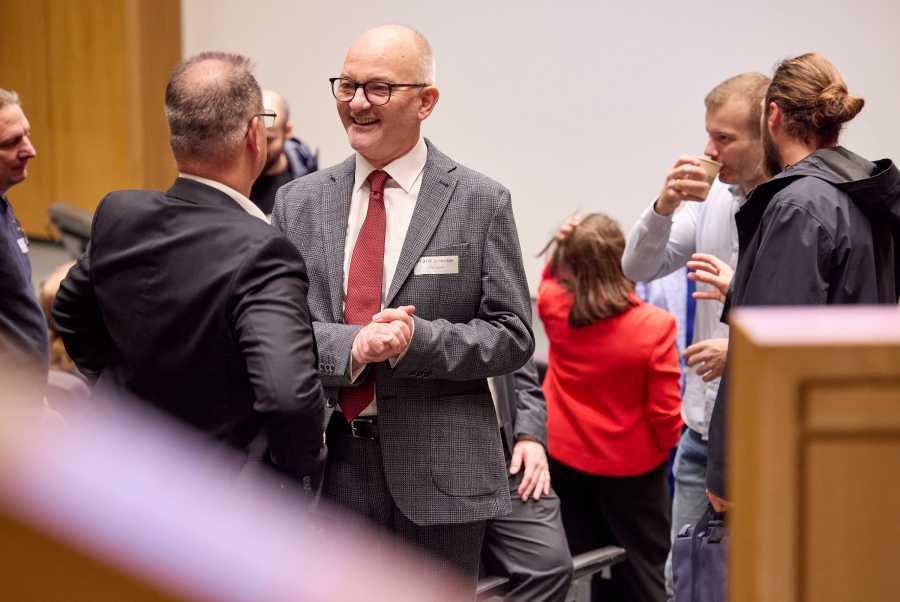
SG Symposium -
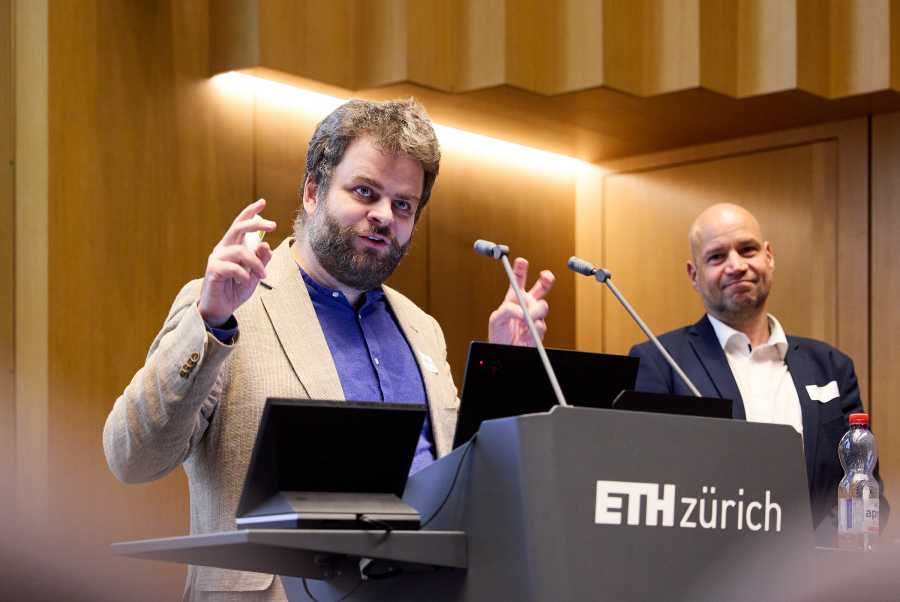
Former SG group members David Garcia and Ingo Scholtes organised the symposium. -
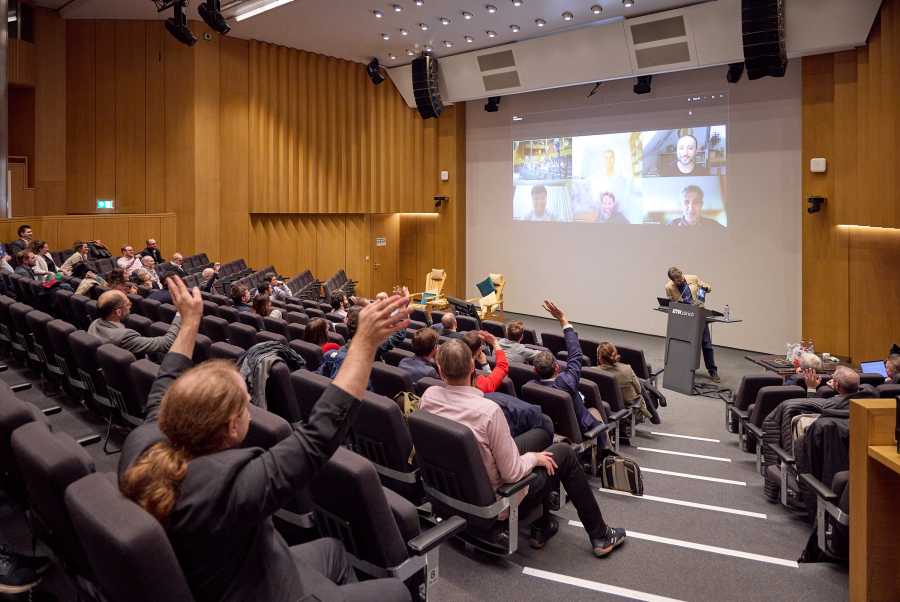
Digital and analogue farewell wishes at the SG Symposium -
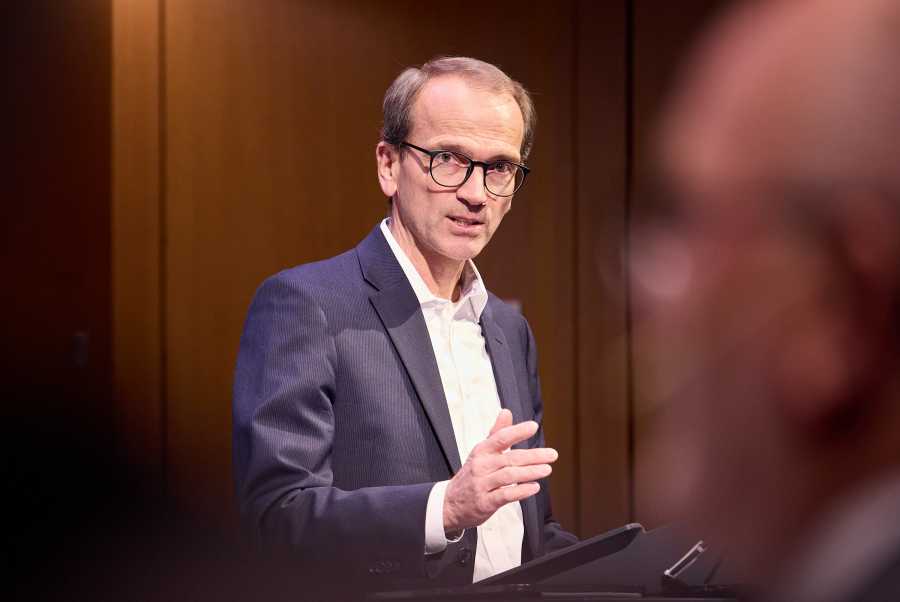
Head of D-MTEC Stephan Wagner lauded Frank Schweitzer at his Farewell Lecture -
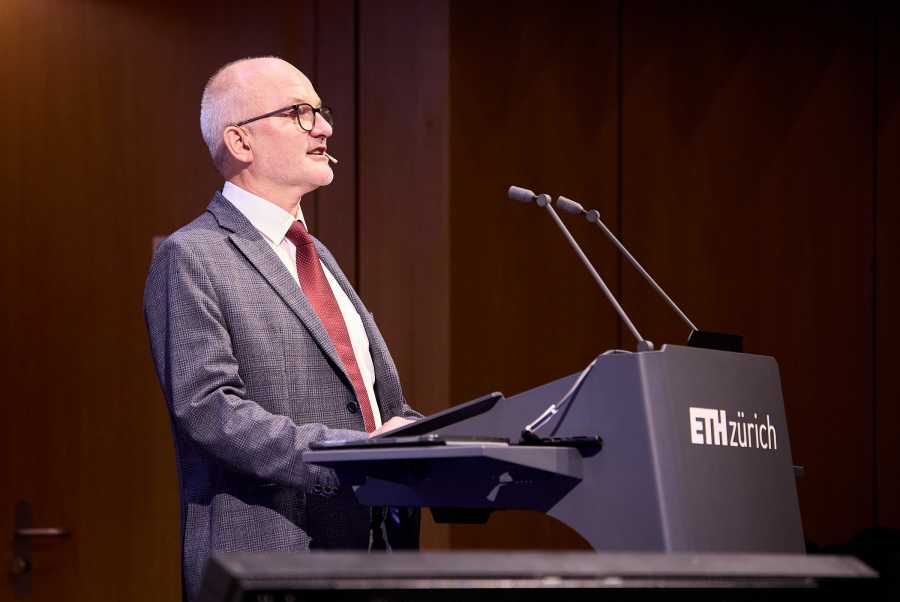
Frank Schweitzer at his Farewell Lecture -

Former ETH President Ralph Eichler in the audience -
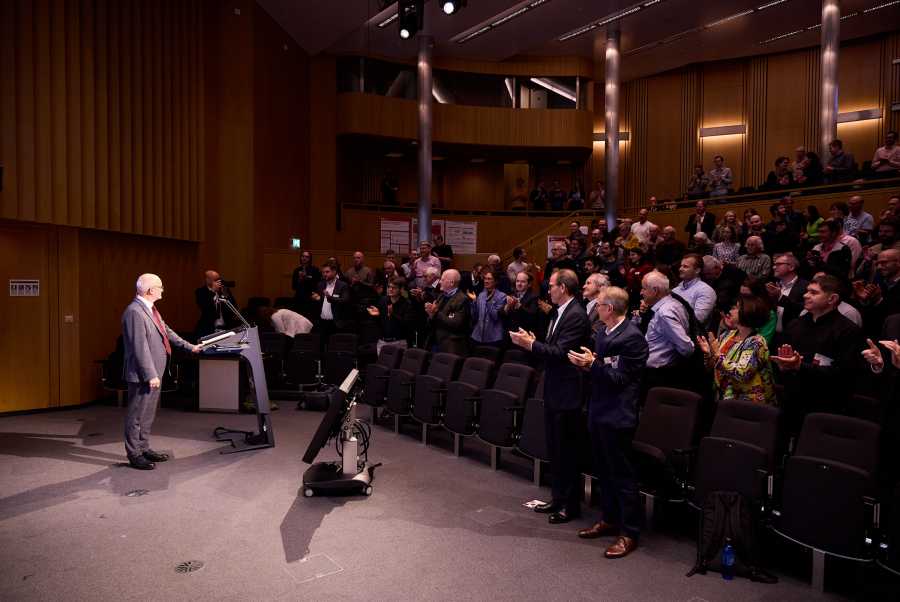
Standing Ovations for Frank Schweitzer -
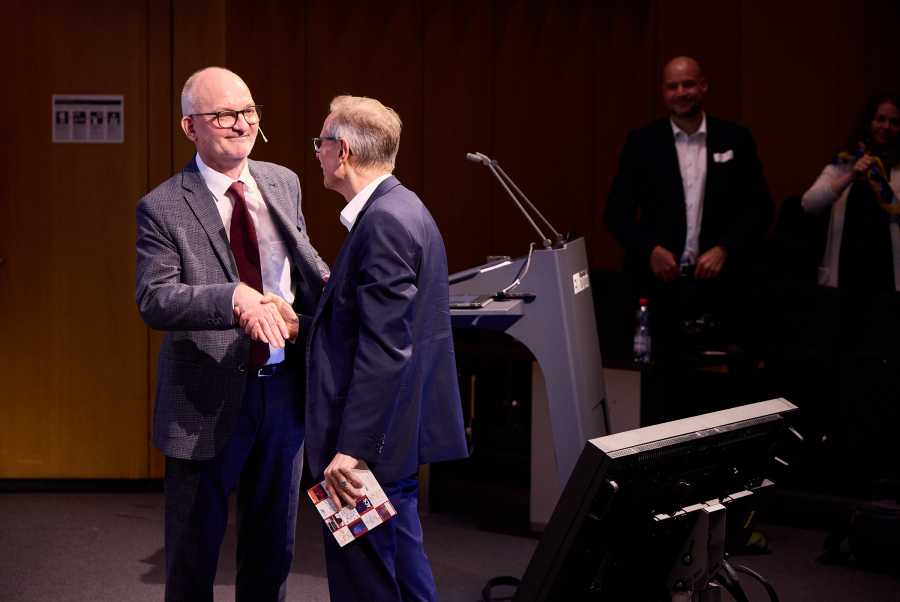
Frank Schweitzer and Rector Günther Dissertori -
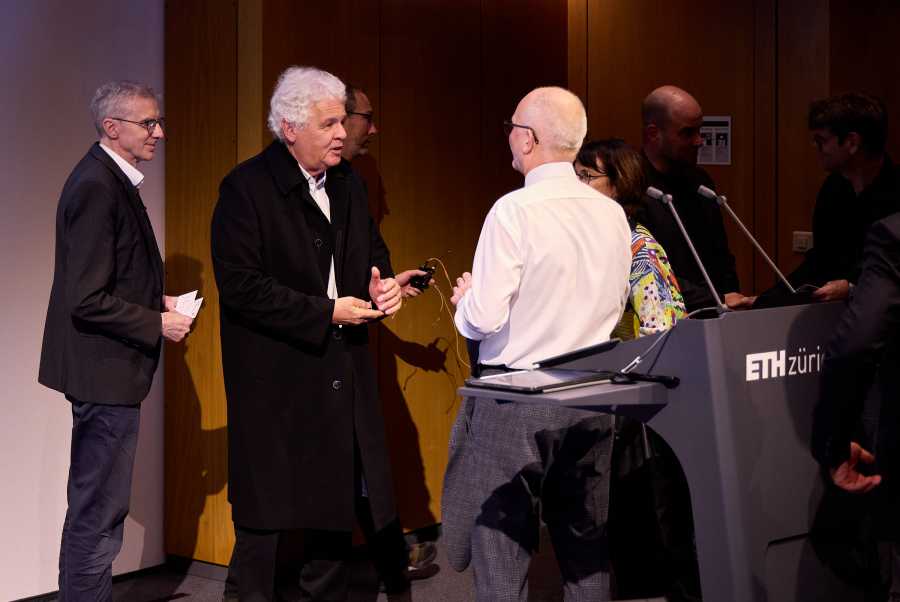
Paul Schönsleben, D-MTEC Professor emeritus, headed Frank Schweitzers appointment committee.
